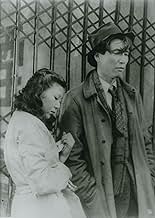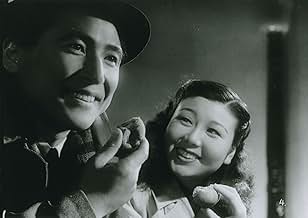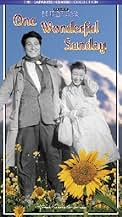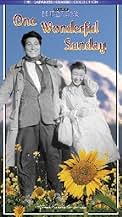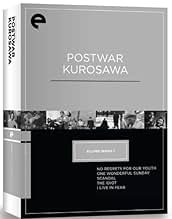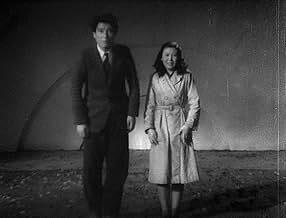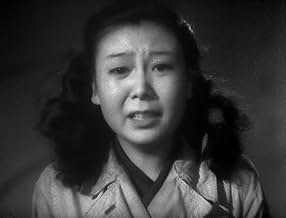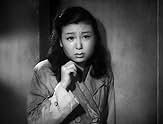NOTE IMDb
7,2/10
4 k
MA NOTE
Lors d'une sortie du dimanche dans Tokyo ravagé par la guerre, Yuzo qui a perdu tout espoir et Masoko encore optimiste cherchent du travail et un logement, ainsi que des divertissements abor... Tout lireLors d'une sortie du dimanche dans Tokyo ravagé par la guerre, Yuzo qui a perdu tout espoir et Masoko encore optimiste cherchent du travail et un logement, ainsi que des divertissements abordables pour passer le temps.Lors d'une sortie du dimanche dans Tokyo ravagé par la guerre, Yuzo qui a perdu tout espoir et Masoko encore optimiste cherchent du travail et un logement, ainsi que des divertissements abordables pour passer le temps.
- Réalisation
- Scénario
- Casting principal
- Récompenses
- 2 victoires au total
Sachio Sakai
- Shady Ticket Man
- (non crédité)
Avis à la une
This is almost like a play and it is a deceptively simple story. Its about a poor couple who get together on Sundays for a date. Essentially, this film is about one of the dates. Nothing earthshattering happens, pretty much life happens. I was at first not convinced by it, but as the film progressed I began to listen to the characters more, meaning the story took on a deeper meaning. The two lead actors are superb, and one thing I do like is that especially Masako is played by a lady who is not beautiful but sweet and just attractive (if this film was remade in America tomorrow, Beyonce would be the star). Actually, its a shame this film wasn't re-made in the United States about 25 years ago. I could see Meryl Streep really flexing her always considerable acting muscles on a role like this. So, it is a film about a date, but its a film about hopes, disappointments and dreams. It gets better as it goes along. I recommend it, its worth your time.
This film provides an interesting counterpoint to other Kurosawa films. Its portrayal of post-war Japan recalls Stray Dog, but the poverty and sleaziness in this case are used as the background for a romance between two very attractive young people, who have a Sunday date, but only 35 yen to spend. Yet there is not the gloom of Lower Depths. Both have jobs and we see his minimally decent rental room. The title seems throughout the film to be rather ironic, since most of the situations they encounter, such as being cheated at a snack bar, are far from wonderful. However, Kurosawa puts a positive spin at the conclusion. I agree with another reviewer that the device of having the girl speak to the audience, seeking our sympathy for young couples without money, who wish to marry, is a very awkward device that distracts from our interest in the relationship. However, I disagree with another reviewer who describes the ending as corny: we've all heard of Capra-corny. This film does not come up to Capra's level, but it is reminiscent of his human interest. It seemed to me that the closing device of the girl's making a date for the next Sunday works very well. Every film needs closure, and this one does not deal in high drama at any point, so a highly dramatic climax would not be appropriate. The viewer who wants that should go to Ran or Kagemusha. In my view, the early Kurosawa films showed him how to develop human relationships: a gift that later would be present in the samurai films, and would make them much more than action epics.
ONE WONDERFUL SUNDAY (1947) has a simple little plot. A young Tokyo couple have almost no money to spend on their only day available for a date. It isn't long until the money is gone, as well as the young man's spirit. The ending is uncomfortably corny, you will squirm in your seat. There is signs of Akira Kurosawa becoming a great director. He makes us pay attention to the decreasing amount of money (much like he made us pay attention to the number of slain bandits in SEVEN SAMURAI, and his stab at Frank Capra style humor is pretty good. A must see for the student of this great director.
I loved this film for all the reasons already advanced on this board. A story about two lovers who have only each other in a devastated, corrupted, and occupied society is universal in every sense.
I think Kurosawa's postwar films are especially interesting from a political point of view. All of his films had to pass U.S. censors, and so his political comments are shrouded in symbolism and cinematic sleight of hand. American occupation authorities doubtlessly viewed this film as a simple tale of struggling lovers. But a closer look reveals much more.
"Yuzo" is a war veteran down on his luck. Millions of Japanese war veterans returned home to a society ashamed of their service and anxious to forget their failure. "Masako" is his lover but their future together is rendered difficult by their mutual poverty.
Kurosawa gives us glimpses of pathetic war orphans, destitute women forced into prostitution, and a new economic oligarchy made wealthy by black markets. The ruins of Tokyo are presented only on distant horizons or as incidental background, but the damage inflicted by the 20th U.S. Air Force is clearly implied. None of these elements would ever pass U.S. censorship had they been essential to the story.
Postwar Japanese audiences. however, doubtlessly recognized these subtle references to their occupied and devastated country. That Kurosawa could express these matters without provoking American censorship is itself a testament to his artistic skills.
I think Kurosawa's postwar films are especially interesting from a political point of view. All of his films had to pass U.S. censors, and so his political comments are shrouded in symbolism and cinematic sleight of hand. American occupation authorities doubtlessly viewed this film as a simple tale of struggling lovers. But a closer look reveals much more.
"Yuzo" is a war veteran down on his luck. Millions of Japanese war veterans returned home to a society ashamed of their service and anxious to forget their failure. "Masako" is his lover but their future together is rendered difficult by their mutual poverty.
Kurosawa gives us glimpses of pathetic war orphans, destitute women forced into prostitution, and a new economic oligarchy made wealthy by black markets. The ruins of Tokyo are presented only on distant horizons or as incidental background, but the damage inflicted by the 20th U.S. Air Force is clearly implied. None of these elements would ever pass U.S. censorship had they been essential to the story.
Postwar Japanese audiences. however, doubtlessly recognized these subtle references to their occupied and devastated country. That Kurosawa could express these matters without provoking American censorship is itself a testament to his artistic skills.
With this warm and uplifting film, the effect Kurosawa achieves is in the simplicity. The story is threadbare. Two lovebirds try to spend a Sunday together in post-war Tokyo and enjoy themselves with only 35 yen in their pockets. Kurosawa never ceases to amaze me because of his incredibly acute comprehension of the visual effects of a story. The simpler the story is, the more it becomes simply a day in their lives. The more it becomes a day in the life, the more upsetting we find the challenges facing them because of the Occupation and the crumbling economy at the time.
It's almost like a lightweight version of The Lost Weekend. There are no debilitating problems like alcoholism or writer's block. There are just obstructions and inconveniences with which the characters can either roll or stew around.
One Wonderful Sunday is a beautiful slice of life from a time that could be many different times in many different places. It's a peaceful movie about the peace that is always there for a given person, their journey being to find it. I have rarely seen a sequence so beautifully crafted on film as the two lovers in the empty, decaying concrete exterior auditorium, where one resolves to create the music they have been struggling to hear. There is hardly a handful of filmmakers living today that would think of such a thing. Kurosawa may have had the clearest, purest understanding of cinema out of any filmmaker.
It's almost like a lightweight version of The Lost Weekend. There are no debilitating problems like alcoholism or writer's block. There are just obstructions and inconveniences with which the characters can either roll or stew around.
One Wonderful Sunday is a beautiful slice of life from a time that could be many different times in many different places. It's a peaceful movie about the peace that is always there for a given person, their journey being to find it. I have rarely seen a sequence so beautifully crafted on film as the two lovers in the empty, decaying concrete exterior auditorium, where one resolves to create the music they have been struggling to hear. There is hardly a handful of filmmakers living today that would think of such a thing. Kurosawa may have had the clearest, purest understanding of cinema out of any filmmaker.
Le saviez-vous
- AnecdotesThe film's climax was considered a failure in both Japan and the U.S. as audiences refused to clap for the lead characters, though supposedly it went over very well in France, gaining much audience participation.
- GaffesA clock is seen above a shop in the baseball scene. The time showing is 5:05, but it is still only morning.
- Bandes originalesLa Cumparsita
Composed by Gerardo Matos Rodríguez
Meilleurs choix
Connectez-vous pour évaluer et suivre la liste de favoris afin de recevoir des recommandations personnalisées
- How long is One Wonderful Sunday?Alimenté par Alexa
Détails
- Date de sortie
- Pays d’origine
- Langue
- Aussi connu sous le nom de
- One Wonderful Sunday
- Lieux de tournage
- Toho Studios, Tokyo, Japon(Studio)
- Société de production
- Voir plus de crédits d'entreprise sur IMDbPro
- Durée1 heure 48 minutes
- Couleur
- Mixage
- Rapport de forme
- 1.37 : 1
Contribuer à cette page
Suggérer une modification ou ajouter du contenu manquant

Lacune principale
By what name was Un merveilleux dimanche (1947) officially released in India in English?
Répondre
